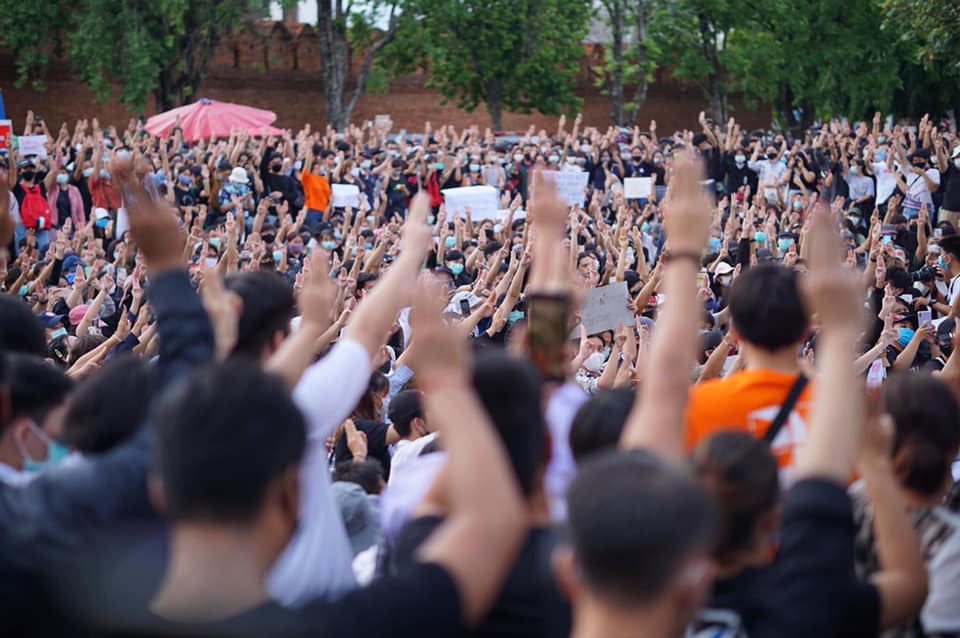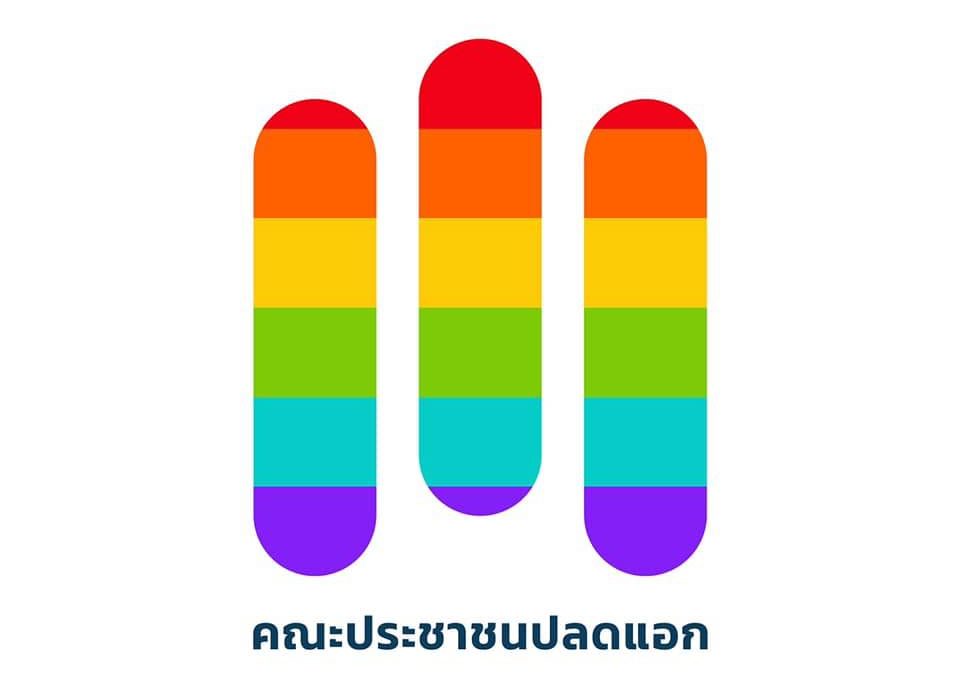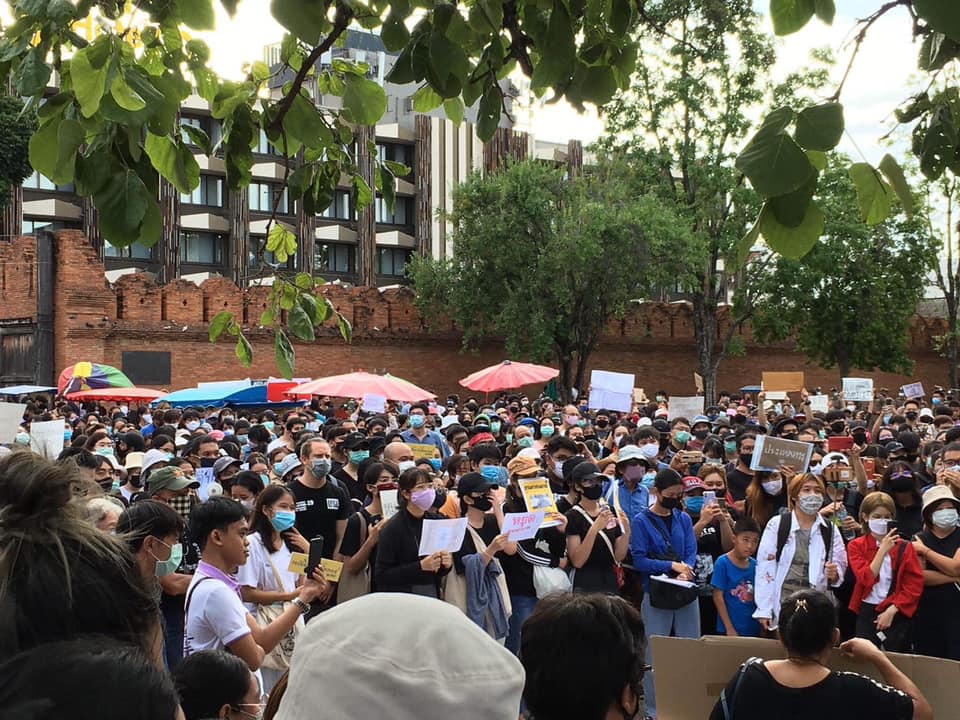by Judha Su and Benjamin Tausig
語言:
English
Photo Credit: Anonymous
FOR THE PAST month, a broad political movement, primarily led by Thai youth, has advanced a series of increasingly provocative protests against the military government.
“We won’t stop until the dark forces are expelled.” Anyone experiencing this ongoing protest must have heard this line. And it is by no means an exaggeration, after Thais have witnessed that the youth movements of secondary school and university students have evolved in scale and matured their message to send a shockwave through the country’s political system.
 Photo credit: Free YOUTH
Photo credit: Free YOUTH
Aiming at a collective of fragile military autocrats, oligarchs, and monarchists who collectively cling to power in the country, these dissidents have made demands of an intensity that pro-democracy protesters in 2010 never reached. In Thai, it is said that they are “dismantling the precedent taboo,” while confronting “you-know-who and you-know-what” issues (especially related to the king) without flinching. This new, ongoing movement has already proved a potent threat—not only to the ruling military government, but to a deep-rooted system of oligarchy, which depends on the absolute sacralization of the monarchy as much as on the feudalist mentality ingrained in the everydayness of Thai society.
The movement is fearless and feisty. Aren’t the authorities trembling at all? Of course, they are. There are continuous reports of harassment and threatening toward the concerned people. In the afternoon of August 26, two student activists—Tattep Ruangprapaikitseree and Panumas Singprom—were arrested. The numerous harassments and forced disappearance of dissidents are a stark contrast to the culture of the impunity for the powerful in Thailand, the Red Bull scandal became the most visible case of this and a subject of much symbolic mockery during the protests. A chronic syndrome is broken and it opens for a new horizon, the question is “How long does it take to reach?”
“In this country, where tyrants trample people, why should we endure our oppression any longer?”
The line of poetry was read aloud by a young man standing on a makeshift stage next to Democracy Monument in Bangkok on July 18, 2020. His speech pierced the warm air, voicing problems that everyone knows to be painfully old. Yet the gathering itself was undeniably new—more overtly bold, younger, and expressed through an aesthetic language drawn from popular cultures as much as from political history. This augural assembly called by the freshly formed Free Youth (เยาวชนปลดแอก) collective, should be regarded as the milestone of following uprisings all over the country. The uprisings sound nothing like what one would have heard at mass protests in this country ten years ago.
The young generation of protesters, including many high school and university students, have made clear that they feel oppression must be confronted in everyday encounters. To that end, and notably, they have bluntly questioned authoritarianism in the educational system. They resist norms of monolithic behavior, suffocating hierarchies of seniority, sexism, and other intersectional oppressions that appear in the classroom. In defiance of how young people are expected and indeed often forced to behave in Thailand, they blur the once-vivid lines that govern the power of elders over youth, creating hashtags like #ขอบคุณนะคะที่กล้าจะสอนหนู (#thankyoufordaringtoteachme). Their struggles are moving rapidly beyond educational spaces, and there is enormous subversive potential in what this movement has begun to do. In response to a cascade of critique, the ruling military junta now accuses young activists and other pro-Democracy figures of being a “faction that detests the country” (พวกชังชาติ).
The activist-poet continued, rhyming in the original Thai:
“This country means everyone, not a bunch of oligarchs,
This country must not silence dissidents,
This country must listen to the people, who define their own lives,
And this country must progress, not regress under patrician men.”
“Let it spread like wildfire” (ขอให้มันเป็นไฟลามทุ่ง), suggested another speaker. And it has. Just one day after the July 18 protest in Bangkok came another gathering in Chiangmai, and more were promptly scheduled in Maha Sarakham, Chonburi, Phrae, Ayutthaya, Pathumthani, Khon Kaen, Lampoon, Udonthani, Pattalung, Nakornsrithammarat, Samutprakarn, Chanthaburi, Nakhon Sawan, Suphan Buri, Roi Et, and elsewhere through August. In the meantime, dissidents post, tweet, share, and broadcast live.
Their discontent is multilateral, horizontal, and polyphonic. Nowadays there are faint echoes of the last mass movement in Thailand, that of the pro-democracy Red Shirt movement of 2010-11. But the current movement has moved well beyond what were, ten years ago, toward unimaginable horizons. On August 7, Free Youth changed its name to “Free People” in an effort to broaden its constituency. A few hours after the announcement, arrest warrants were issued for 31 protest leaders, and the conflict intensified yet again.
ON THE EVE of the pandemic, Thailand’s Constitutional Court dissolved the liberal Future Forward Party (FFP), banning its executives from politics for ten years. As a result, many first-time voters saw their votes in the most recent election quite literally tossed into the trash. It was over this issue that young people began to protest all over the country, at first in limited ways. But their initial discontent has since grown to greater proportions and visibility. The pandemic and lockdown nearly obscured the flash mobs organized by university students since early 2020, but the mobs have proved their resilience.
 The Free People logo
The Free People logo
The country was in uproar when the government failed to provide support to a majority of people who have severely suffered from the pandemic lockdown. This reveals the government’s incapability, and even worse, their authoritative attitude toward crisis management. For instance, a double standard of treatment between citizens and the VIPs is highly evident, with hunger and unemployment emerging on the surface. The government has been using the coronavirus as an excuse to extend its draconian emergency law, which is a means to control its citizens, not the virus. And such ongoing dysfunction and authoritarianism by the government in dealing with the virus has pressed further down on the brewing unrest.
During a recent protest organized under the banner of #อีสานสิบ่ทน (“Isaan (northeastern Thailand) won’t take it”) at Mahasarakham University, one high school student spoke about hunger and unemployment. She argued that social welfare is a right—“it is not about mercy, not about owing someone a favor.” In her speech, the young student addressed enduring problems, especially the feudalism and systems of patronage that make people feel indebted merely for receiving the help to which they are entitled as human beings.
The results have been profound. Chants calling for an end to the Thai monarchy or impugning the current king have become common. At Walailak University in Nakhon Sri Thammarat, for example, one banner read “We need no reformation, only revolution.” Another declared “We are not O,” a characteristically sly pun meaning, on the surface, “we are not OK,” but in a double-entendre also suggesting that “we are not with the King.” Unsurprisingly, the banner had mysteriously disappeared the following morning—insulting the king is among the most serious crimes in the country.
On July 24, the army chief general Apirat Kongsompong trotted out a chauvinistic narrative about the king and his subjects, creating a maudlin, tearful spectacle. But the younger generation have spent their lives subjected to military propaganda in schools, and they have also grown up amidst simmering political unrest. Bluntly put, they will not accept cheap sentimentalism, while bearing witness to so many forms of violence and demeaning and antidemocratic treatment of citizens by their government.
In fact, this irreconcilable fracture is not only about the political but also the cultural. After the protest of July 18, some pro-government people criticised the youth movement for being “cutesy.” Such a dismal triggered a creative protest calling themselves #ม๊อบไม่มุ้งมิ๊งแต่ตุ้งติ้งนะคะคุณรัฐบาล (“Not a cutesy but sissy mob, my darling government”). They called for marriage equality, LGBTQ rights, and finally raised the rainbow flag, while walking around the Democracy Monument in the old town of Bangkok.
It’s an interesting move of the young protesters that they have brought their everyday cultures into the political sphere. Shall we say enough to wear out the leftist language from the 60s-70s? Then, what would you say to the “Hamtaro” theme song? Another day, the protesters invited a hamster from the Japanese cartoon to march and sing a song “The most delicious food is taxpayers’ money,” and they yelled “Dissolve the parliament! Dissolve the parliament! Dissolve the parliament!” Many more thematic protests are to come. Soon we will see “Harry Potter” protest, which with its familiar phrase, “You know who” (#คนที่คุณก็รู้ว่าใคร), fits perfectly well with the political climate in Thailand.
ON AUGUST 10, Panusaya Sithijirawattanakul, a member of the group called themselves ‘Thammasat and the Political Assembly”([a pun on “Thammasat and Political Science”) gave a majestic speech during the assembly at Thammasat University, Rangsit campus, she proposed “10 demands to resolve the problems with the monarchy,” causing another wave of awareness that the precedent limit of public speech has now been surpassed. She demanded that everything must be said publicly before closing the stage with the phrase “Death to Feudalism, Long live the people.” (ศักดินาจงพินาศ ประชาราษฎร์จงเจริญ).
A few days later, the gathering at Chulalongkorn became a stage to criticise the privileged, including the so-called pillars of the nation’, such as Chulalongkorn University, the oldest university in central Bangkok. The program was well-planned, as the representative students recounted the history of political movements, the political dissidents, and acknowledged of the Red Shirt movement a decade ago.
These sporadic assemblies strengthen the youth movement and send a message to the public that they can actually hope for a better politics. Through the long-awaited and biggest protest on August 16, public discontent manifested itself on Rachadamnoen Road. Youth carried the vibe while diverse groups of protesters joined, including Red Shirt supporters whose dream is now carried on by this youth movement. The assembly was a mixture of multiple forms of cultural expressions—from conventional protest, street theatre, comedy, drag to a concert. It was the presence of magnitude, that no one was able to capture the whole image at once.
 Photo credit: Free YOUTH
Photo credit: Free YOUTH
As symbols are reinterpreted and reintroduced, one of those is a white bow is required for female students in many girls’ schools. “School is the first dictator,” the youth movement stated outright. On August 19, the protest called for fellow students to visit “the Ministry [of Education] after class,” the protesters flaunted the once-obedient symbol, which abruptly retranslated into the critical symbol of the uprising against the authoritarianism in Thai schools, and many other deep-seated problems in Thai education.
Stronger than the will to fight is the will to end the fight. Young Thais hope for a permanent change so that tyranny, as one recent hashtag has it, “This will end in our generation” (#ให้มันจบที่รุ่นเรา). This ongoing uprising could be a long fight, and it could take longer than one generation to win. But, by all means, it is a worthwhile dream Thai people could have. As written on one protest banner, this is the dream to “Crush the crown into pieces, then scatter the shards to the rightful owners of the land.”
What is happening in Thailand is worth watching not only as a local upheaval, but as a sign of pandemic-era global political unrest. Still much is up in the air with the protests. Again, this could perhaps be the beginning of a new and prolonged fight. And who knows if the coming assembly in September might, in the end, set forth the coldest winter?
Judha Su is a founder and editor-in-chief of ซอย | soi, a platform for writing, editing, and publishing in the expanded field. She is also a feral writer and critic focusing her research on multiple relationships between poetics, performance, and pedagogy.
Benjamin Tausig is a music professor at SUNY Stony Brook University. His research focuses on sound and dissent in Southeast Asia and elsewhere. He is currently working on a book about the queer jazz musician Maurice Rocco, and musical/colonial engagements between Thailand and the West during the Vietnam War more broadly.

